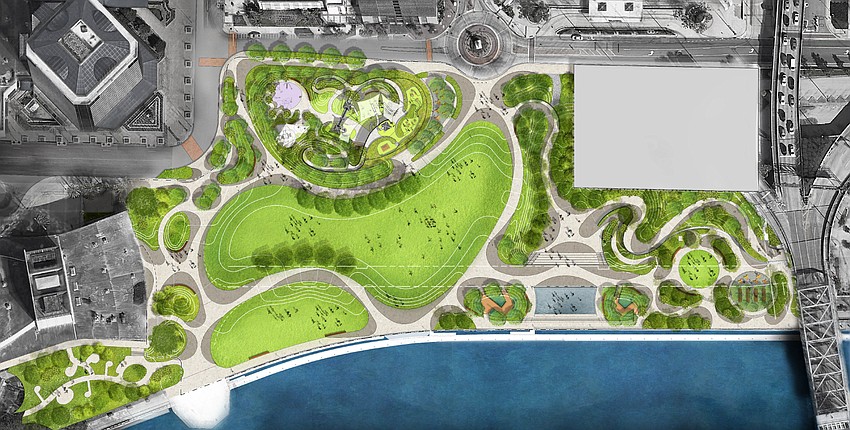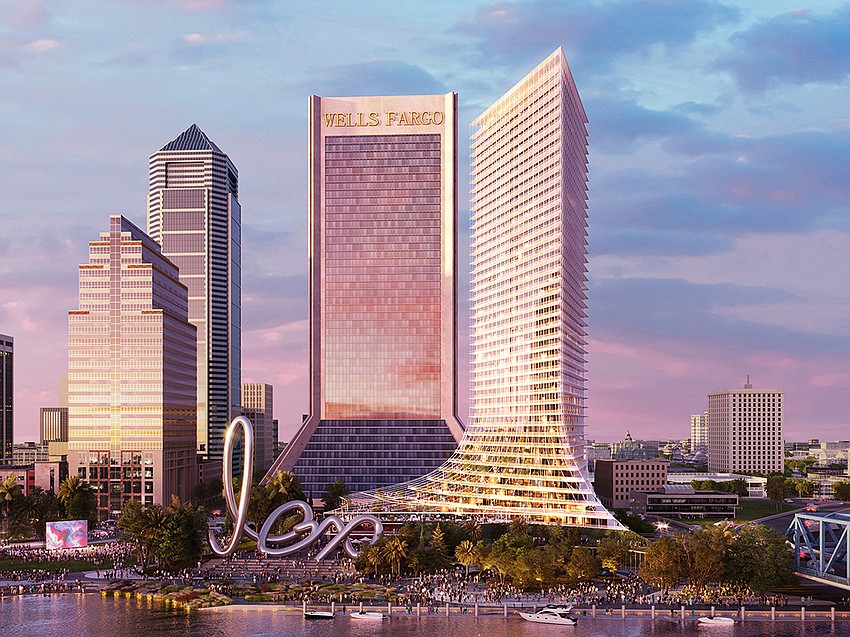
A former chair of the Downtown Investment Authority board is urging the city of Jacksonville to reject a proposed land swap for property to provide for the University of Florida’s proposed LaVilla graduate center campus.
It’s a sentiment shared by an advocacy group for riverfront parks, which also is speaking out on the issue.
In emails to the City Council shared with the Daily Record, former DIA Chair Jim Citrano Jr. and Riverfront Parks Now offer separate suggestions related to the exchange of city-owned property in Riverfront Plaza for the privately owned Interline Brands Inc. building at 801 W. Bay St.

The emails come as the Jacksonville City Council prepares to decide on a proposal to swap for the building or buy it outright from Gateway Jax, its owner since October 2024.
Gateway Jax has committed to building a 17-story tower with a hotel, condos, restaurants, retail square footage and public spaces on a 1.26-acre redevelopment pad on the northeast corner of the plaza site.
UF says it will invest $7 million to retrofit the Interline building and launch classes there in fall 2025. The city intends to provide an initial set of five properties, including the Interline building, to UF. They include two vacant lots to the west of Interline, the historic Jacksonville Terminal rail station and the new portion of the Prime F. Osborn III Convention Center along with its parking lot.

UF plans to start its first new construction on the vacant lots, then demolish the new portion of the convention center for additional buildings.
The rail station would undergo an adaptive reuse that would retain the exterior and transform the interior for campus use, possibly with restaurants and retail.
Council’s current options for acquiring the Interline building are Resolution 2025-0291, which would direct the city to purchase it for up to $8 million, and 2025-0319, which would exchange the Riverfront Plaza site and an option on an adjacent property to the east for it.
Gateway Jax has said it would sell the property for $6.95 million. If there is a swap and Gateway Jax and the city can’t come to an incentive deal, the city can buy back the Riverfront Plaza site for $6.35 million.
Both Citrano and Riverfront Parks Now support the outright purchase option.
Concerns about cost
Citrano, who served on the DIA board from March 2020 through January 2025, said the Plaza redevelopment parcel poses challenges for builders.

In a May 27 email to Council members, DIA CEO Lori Boyer, current DIA board Chair Patrick Krechowski and others, he questions whether Gateway Jax’s proposed tower could be built with $20 million in completion grants, the amount at which those incentives would be capped under city legislation.
Citrano said he believes there is “considerable risk that the final cost to taxpayers could exceed this figure substantially” due to the complexities of developing on the site.
Among those, he said the property offers limited size relative to the conceptual project’s scale. Utilities would need to be moved, he said, and the pad’s proximity to the Main Street Bridge also presents complications to construction.
Citrano said that under a master plan for Riverfront Plaza, developed by Chicago designer Perkins & Will, there would be coordinated development of the pad and the east portion of the plaza park. A tower and a beer garden in Perkins & Will’s plan would include a shared retaining wall for instance.

Whether the tower and park can be built in concert is unclear, considering that the city has yet to fund the construction of the east half of the park. The west half is under construction.
“These factors make the parcel’s development highly complicated and necessitate coordinated construction timelines with Phase II of the park,” he wrote. “In real estate development, ‘complicated’ often translates to ‘expensive.’”
More study needed
Citrano, the DIA board’s president from July 2023 to June 2024, said the complexities of the site were evident when the DIA received only one response to its original request for proposals from developers for the property. That respondent was New York-based American Lions, which later withdrew after determining that its proposed 44-story residential tower was not feasible.

“Recognizing the need for flexibility, the DIA subsequently hired a consultant to explore interim uses for the site, anticipating that synchronization between park development and private construction might not proceed as planned,” Citrano wrote.
“Simultaneously, the DIA was receiving growing community feedback, advocating for alternative uses — ranging from lower-density commercial buildings to full integration of the space into expanded parkland.”
The DIA voted to seek the consultant referenced by Citrano in the fall of 2024 to perform an “optimal use study” for properties in and around Riverfront Plaza.
“This effort appears to have been abandoned in favor of the current land swap proposal. Why?” Citrano wrote.
“The DIA should continue with the optimal use study, prioritize community input, and thoroughly assess all potential alternatives for the development of the northeast corner parcel. Doing so may require a redesign of Phase II of the park, but it could better align with the long-term public interest, community sentiment, and potentially reduce the city’s financial obligations.”

Citrano concludes that if the study found that a tower project was the best option, the property should go back out for proposals from developers so that competing offers could be fully scrutinized.
“This should include thorough due diligence into each developer’s background, experience, and financial capacity,” he wrote. “An RFP is always in the best interest of taxpayers, whom the City and DIA are duty-bound to represent.”
In an interview, Citrano said he initially had not planned to address the situation publicly but changed his mind after the Council Committee of the Whole discussed the land swap during a May 21 meeting.
That day, Council member Chris Miller said he had been hearing only from supporters of the swap and that he would be interested in learning counterpoints.
Citrano said that given his experience on the board and his knowledge of the situation, he felt compelled to speak out.
He emphasized that his opinions were not directed at Gateway Jax but on the plaza properties. He said he is a strong supporter of Gateway Jax, which is moving forward on a Downtown development that comprises 25 city blocks across 32 acres if fully realized.
Citrano demonstrated his support of Gateway Jax as a DIA board member, voting for incentives for the development.
Coming forward
Like Citrano, the steering committee of Riverfront Parks Now said it was reluctant to publicly discuss the issue but had “been encouraged to share our perspective in keeping with our role as a civic advocacy group.”
In an email to Council members and members of Mayor Donna Deegan’s administration, the group offers a third option that includes a low-rise building with a multilevel restaurant and retail space.

“Tampa’s riverfront offers a proven model, with places like the two-story Armature Works and one to three-story Sparkman Wharf that draw people in and energize the area,” the email states.
“These vibrant spaces thrive without towers — offering public benefits without costly city-funded financial incentives.”
Riverfront Parks now offers another example closer to home, The HUB Brooklyn multiuse restaurant, office and event space under construction at 400 Riverside Ave. The HUB will be anchored by Southern Grounds, the Sky Bar and Alder & Oak.

“This type of structure could allow the City to retain long-term control and ownership of the land while providing leased space for restaurants and rooftop dining that integrate seamlessly into the park,” the group wrote, adding that the smaller-scale approach satisfies public interest in riverside dining options while fitting with the character of the park.
Other benefits
The group says its approach could save the city tens of millions of dollars in incentives and utility relocation costs over a tower, requires less parking and promotes a pedestrian-friendly space.
The project would generate tax revenue and, through contributions from occupants of the spaces, could help pay for park maintenance.

“Riverfront Parks Now respectfully recommends the City retain ownership of the back corner of the Landing and lease it to partners who will help create a vibrant, welcoming park in the heart of downtown—delivering the energy of a whole park as soon as possible,” the email says. “We urge you to consider this appealing less costly, faster, more park-forward alternative!”
Signees are chair Natalie Rosenberg and members Susan Caven, Barbara Ketchum, Michael Kirwan, Jimmy Orth, Ted Pappas and Nancy Powell
On its website, Riverfront Parks Now describes itself as a coalition of nonprofit organizations working with city leaders, the business community and residents to foster development of parks and green spaces Downtown.
Swap supporters
Supporters of the swap, including Deegan and Gateway Jax, say it supports the mission of the DIA to place city-owned property in the hands of developers and back on the tax rolls.
The tower would bring local residents and visitors alike to Riverfront Plaza, helping spark Downtown revitalization and providing activities in the park.
Gateway Jax says it also will impose a surcharge on the hotel rooms and an HOA fee on condos to provide $700,000 per year for maintenance and activities in the park.
Among other points from supporters, they note that appraisals obtained by both parties place the value of the riverfront properties at a combined $5 million and the Interline building at a minimum of $6.25 million, which balances in the city’s favor.
Gateway Jax says the tower would yield $1.16 million per year in property taxes from the hotel and condos, plus $35 million in incremental ad valorem tax revenue.